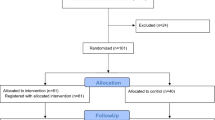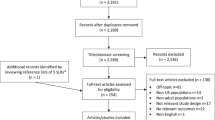Abstract
Adverse events that patients attribute to their drug treatment are generally considered to reduce adherence to medication. However, some patients interpret such symptoms as indicating drug effectiveness. If perceivedly effective drugs are more likely to be taken then adverse events may increase adherence. The extent to which patients interpret adverse events as indicating drug effectiveness is not well known. We investigated this in a cross-sectional questionnaire study of 1013 drug-treated hypertensive patients from 55 primary health-care centres and 11 internal medicine clinics in Sweden. We hypothesized that estimates of future risk of complications of hypertension made by hypertensive patients who had adverse events would be lower than estimates made by patients who did not have adverse events, and that these estimates would only differ when patients were estimating their risks in a setting where they continued taking antihypertensive drugs. Patients' risk estimates were measured with visual analogue scales and adverse events were detected by an open question. Contrary to our hypothesis, patients with adverse events (25.7%) gave higher estimates of future risk in the continuing medication setting. This association persisted in a multivariate analysis, where a number of factors related to adverse events and risk were controlled for (OR 1.76 (95% CI, 1.26–2.45), P=0.001 for the most highly correlated risk measure), but risk estimates did not differ between patients with and without adverse events in the setting of not continuing medication. Possible explanations for these findings are pre-existing differences in attitude towards drugs and level of fear of complications.
This is a preview of subscription content, access via your institution
Access options
Subscribe to this journal
Receive 12 digital issues and online access to articles
$119.00 per year
only $9.92 per issue
Buy this article
- Purchase on Springer Link
- Instant access to full article PDF
Prices may be subject to local taxes which are calculated during checkout
Similar content being viewed by others
References
Mulrow CD, Pignone M . What are the elements of good treatment for hypertension? BMJ 2001; 322: 1107–1109.
Edwards IR, Aronson JK . Adverse drug reactions: definitions, diagnosis, and management. Lancet 2000; 356: 1255–1259.
Haynes RB, McDonald H, Garg AX, Montague P . Interventions for helping patients to follow prescriptions for medications (Cochrane Review). The Cochrane Library, Issue 2, 2002.
Svensson S, Kjellgren KI, Ahlner J, Säljö R . Reasons for adherence with antihypertensive medication. Int J Cardiol 2000; 76: 157–163.
Britten N . Patients' ideas about medicines: a qualitative study in a general practice population. Br J Gen Pract 1994; 44: 465–468.
Lorish CD, Richards B, Brown Jr S . Perspective of the patient with rheumatoid arthritis on issues related to missed medication. Arthritis Care Res 1990; 3: 78–84.
Leventhal H et al. Adaptation to chemotherapy treatments. In: Andersen BL (ed). Women with Cancer: Psychological Perspectives. Springer-Verlag: New York, 1986, pp 192–193.
Fallsberg M . Reflections on Medicines and Medication: A Qualitative Analysis Among People on Long-term Drug Regimens Linköping University: Linköping, 1991.
Horne R, Weinman J, Hankins M . The beliefs about medicines questionnaire: the development and evaluation of a new method for assessing the cognitive representation of medication. Psychology Health 1999; 14: 1–24.
Kjellgren KI et al. Perceived symptoms amongst hypertensive patients in routine clinical practice – a population-based study. J Intern Med 1998; 244: 325–332.
Kjellgren KI et al. Patients' and physicians' assessment of risks associated with hypertension and benefits from treatment. J Cardiovasc Risk 1998; 5: 161–166.
Os I et al. Lisinopril or nifedipine in essential hypertension? A Norwegian multicenter study on efficacy, tolerability and quality of life in 828 patients. J Hypertens 1991; 9: 1097–1104.
Kjellgren KI, Svensson S, Ahlner J, Säljö R . Antihypertensive medication in clinical encounters. Int J Cardiol 1998; 64: 161–169.
Svensson E . Ordinal invariant measures for individual and group changes in ordered categorical data. Stat Med 1998; 17: 2923–2936.
Acknowledgements
We thank Peter Mansfield, Thomas Hedner, Hans Gill and two anonymous referees for valuable comments on the manuscript. Sahlgrenska University Hospital provided financial support (LUA) for SS. Financial and staff support for the collection, entry and monitoring of data came from Merck & Co. Inc.
Author information
Authors and Affiliations
Corresponding author
Rights and permissions
About this article
Cite this article
Svensson, S., Kjellgren, K. Adverse events and patients' perceptions of antihypertensive drug effectiveness. J Hum Hypertens 17, 671–675 (2003). https://doi.org/10.1038/sj.jhh.1001596
Received:
Revised:
Accepted:
Published:
Issue Date:
DOI: https://doi.org/10.1038/sj.jhh.1001596
Keywords
This article is cited by
-
Danish Physicians’ Views on the Appropriateness of the Involvement of Patients with Type 2 Diabetes in Regulatory Decision Making: A Qualitative Study
Pharmaceutical Medicine (2019)
-
A psychosocial perspective of medication side effects, experiences, coping approaches and implications for adherence in hypertension management
Clinical Hypertension (2015)
-
Relationship of treatment satisfaction to medication adherence: findings from a cross-sectional survey among hypertensive patients in Palestine
Health and Quality of Life Outcomes (2013)



